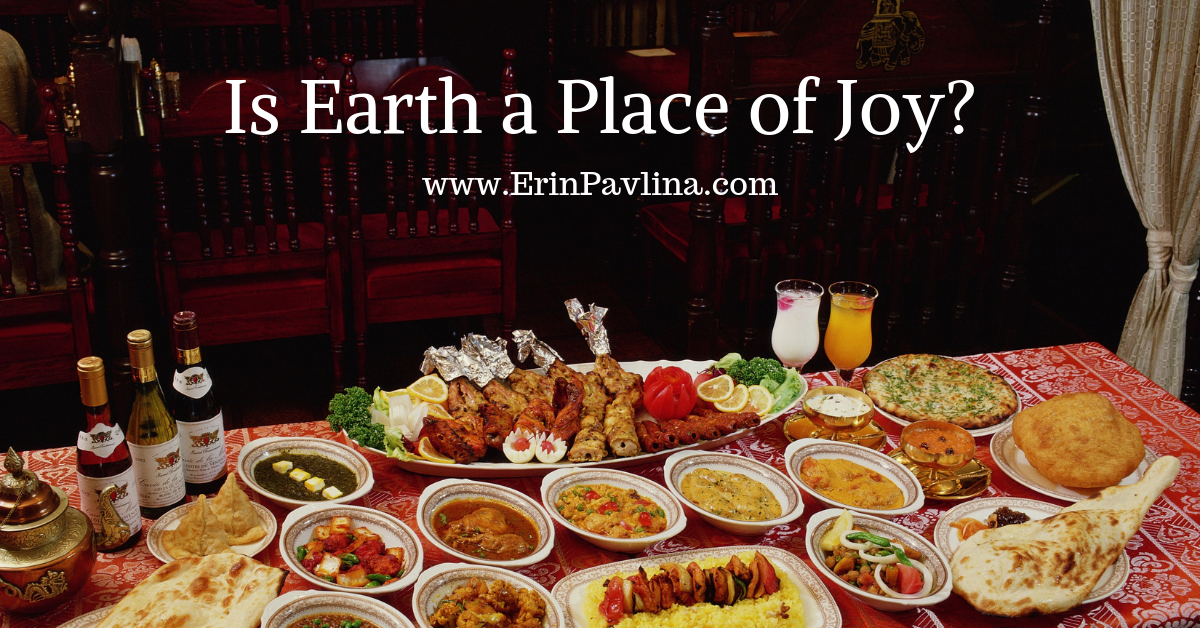Every time I write an article where I espouse the idea that the reason for our existence on Earth is to experience joy I get a lot of pushback from people about suffering.
“Why would anyone come here when there is so much suffering in the world?”
“How can you say our purpose is to experience joy when the world is so violent?”
“I have suffered all my life, where is this joy you speak of?”
“I’m never coming back to Earth, it’s horrible here.”
In past articles I have asserted that coming to Earth is like going on vacation. We want to experience physicality. We want to do the things we can only do while in a body.
I have asserted that life is like a playground. You come and play for awhile and go home.
But again, there is this pushback about suffering.
“Tell that to the people in Syria!”
“Tell that to the kid who is paralyzed from the neck down. Does HE think Earth is a playground?”
“Tell that to the mom who watched her baby die of meningitis.”
So I’m going to use an analogy to explain how this all works and hopefully there will be greater understanding of the joy vs. suffering conundrum.
Imagine that you walk into a great hall and there are tables all neatly positioned. On the tables are an array of the most amazing foods you could ever want to eat.
You are invited to sit down at a table and begin feasting. Eat as much or as little as you want. Eat whichever foods appeal to you and skip the ones that don’t.
The feast is free. You may eat to your heart’s content.
This is what the creator of the meal has given us; an opportunity to enjoy something amazing and wonderful, to sit with friends or make new ones. You can try some new dishes or stick with the ones you know you like.
When you are done feasting, you excuse yourself and leave the table. You have had an enjoyable and memorable meal and you look forward to coming back to the feast again one day and trying new dishes and dining with new companions.
That is the joyful experience we are entitled to. That is life.
Now imagine you are sitting at your table, enjoying your meal, chatting with those next to you, and someone decides, for whatever reason, to pick up a pile of mashed potatoes and fling it at your face.
Suddenly your joyful meal is interrupted. You get a face full of mashed potatoes, and you have a choice to make. You can fling some food at your attacker. You could use your napkin to wipe off your face. You could make light of the incident and shrug it off. You could laugh about it. You could move to another table. Your reaction to the free will choice of another is entirely up to you.
Now let’s say someone comes to the feast and decides that their meal offends them in some way. They don’t like what they are seeing, hearing or eating, so they upend the table, knocking all the food to the floor, and possibly hurting some diners in the process.
Chaos ensues. Other diners who were sitting at that table have had their entire meal disrupted.
It’s terrible. The free will actions of one person are capable of negatively affecting the other diners at the table.
This is not the fault of the feast. This is not the fault of the creator of the feast. This interruption of joy falls squarely on the shoulders of the person who knocked over the table.
A reaction occurs. Maybe some folks try to forcibly remove that person from the feasting hall. Maybe there is resistance and a fight breaks out. It affects other diners who were peacefully eating their meals. Eventually several tables are involved in the scuffle and no one is enjoying their feast.
This is the suffering that you see in the world, but it does not change the nature and intent of the feast itself.
One person’s actions can disrupt the feast, that’s true. You can be hurt, injured or even killed by the free will actions of the people in the hall. It’s not fair, but it does happen.
What happens in the world is the result of the free will actions of all of us. The VAST majority of people on Earth simply want to live in peace and harmony with each other and the planet. All it takes to disrupt our joy is the negative free will action of one or a few people.
But that is not the fault of the Earth itself. That is the fault of the people living on the Earth.
This world was created for us to enjoy physicality. We are the caretakers of that experience. And while there is certainly suffering in the world, we can work together to ensure a pleasant experience for future generations by helping those who seek to disrupt our joy to find love and harmony instead.
We did not come here to suffer. That is not what this Earth is for. Enjoy the feast, and if someone disrupts your joy, move to another table and continue eating, or help fix the table where you were sitting. Your choices determine your dining experience. Your choices determine your level of joy.


